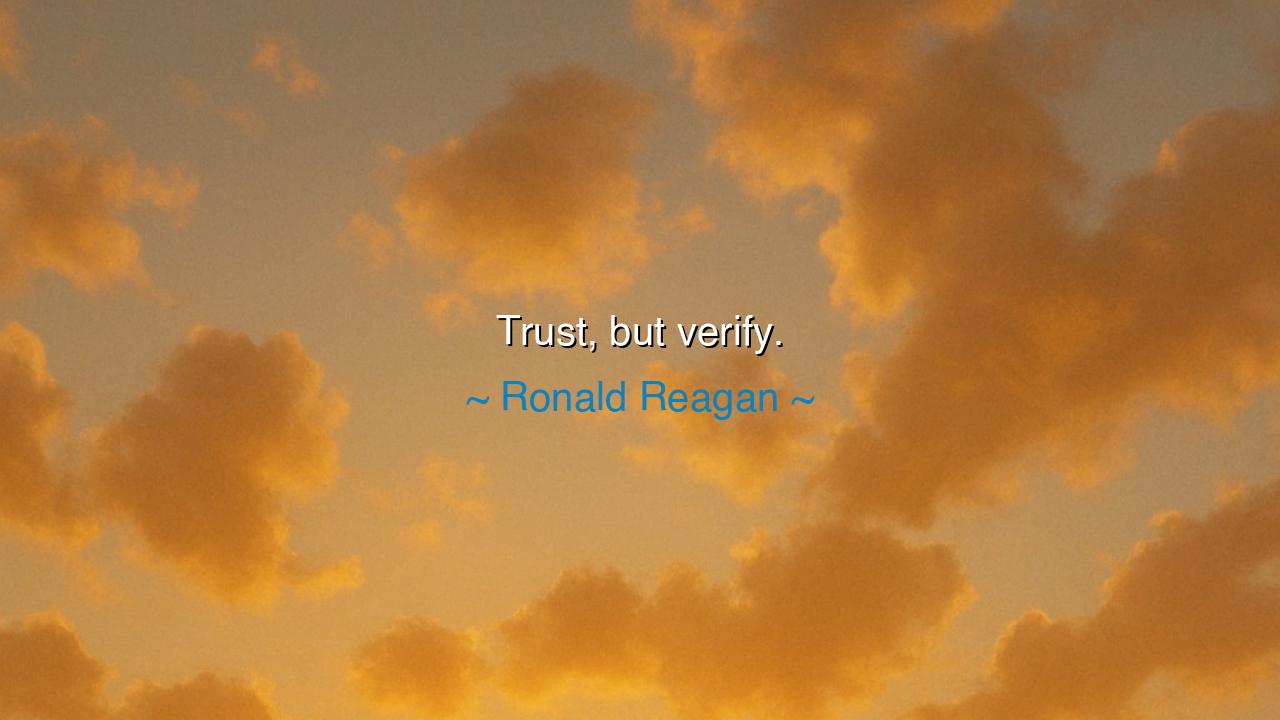
Trust, but verify.






Ronald Reagan, the forty–first President of the United States, spoke with a wisdom forged in the tension of the Cold War when he said: “Trust, but verify.” These words, borrowed from a Russian proverb, became his guiding phrase in dealings with the Soviet Union. Yet they extend beyond treaties and weapons — they are a teaching about human nature, about balance in all our dealings. For trust is the foundation of peace, but verification is the guardian of truth. One without the other is incomplete; together, they form the twin pillars of wise judgment.
The ancients, too, would have recognized the weight of this maxim. The Greeks honored pistis — trust — as the bond that held communities together, but they also prized dokim? — testing, examining — as the safeguard of justice. Blind faith, they warned, leads to ruin, for men are not gods. But endless suspicion poisons the heart, leaving no room for fellowship. Thus Reagan’s phrase echoes the timeless law: to trust is noble, but to verify is prudent.
History gives us vivid proof. At the height of the Cold War, the superpowers faced annihilation if mistrust ruled their actions. Treaties of arms control were signed, but words alone could not guard humanity from ruin. Reagan, though willing to extend the hand of trust, demanded also the instruments of verification — inspections, monitoring, accountability. In this way, peace was preserved, not by naivety, nor by cynicism, but by the balance of faith and vigilance. His phrase, repeated in negotiations, became more than a policy; it became a philosophy of survival.
We may see its mirror in other times as well. When Julius Caesar crossed the Rubicon, he shattered the fragile trust of the Roman Republic, which had placed too much faith in his ambition and too little in the checks upon his power. The Republic trusted but did not verify, and so it fell. Yet consider the life of George Washington, who won the trust of his people by consistently submitting himself to their scrutiny. His leadership was both trusted and verified, and thus he left a nation free, not enslaved.
Children of tomorrow, hear this wisdom: do not be naïve, but do not be hardened. To trust without verification is to walk blindfolded on the edge of a cliff. To verify without trust is to live always in fear and suspicion. The path of wisdom is the union of the two. Place trust where it is due, but let your trust be girded with discernment. Believe in others, but hold them — and yourself — accountable. In this balance lies peace of mind and strength of community.
The lesson is clear: in your friendships, in your work, in your dealings with nations or neighbors, practice trust, but verify. Do not shrink from offering trust, for it is the soil in which loyalty grows. But neither shrink from testing, for it is the fence that guards the field. This way, you honor others with confidence while protecting yourself from deceit.
Practical action flows from this teaching. When entering agreements, write them with clarity and hold them to account. When giving responsibility, grant it with trust but measure the fruit that follows. When listening to promises, honor the speaker with belief, but examine the truth of their actions. In this way, you will neither be a fool who is deceived, nor a cynic who cannot love, but a wise one who walks the narrow path between.
So let it be remembered: “Trust, but verify.” Reagan may have spoken these words to shield the world from destruction, but they belong to all men and women. For in them lies the wisdom of peace, the balance of faith and vigilance, and the art of living with both open hands and watchful eyes.






AAdministratorAdministrator
Welcome, honored guests. Please leave a comment, we will respond soon